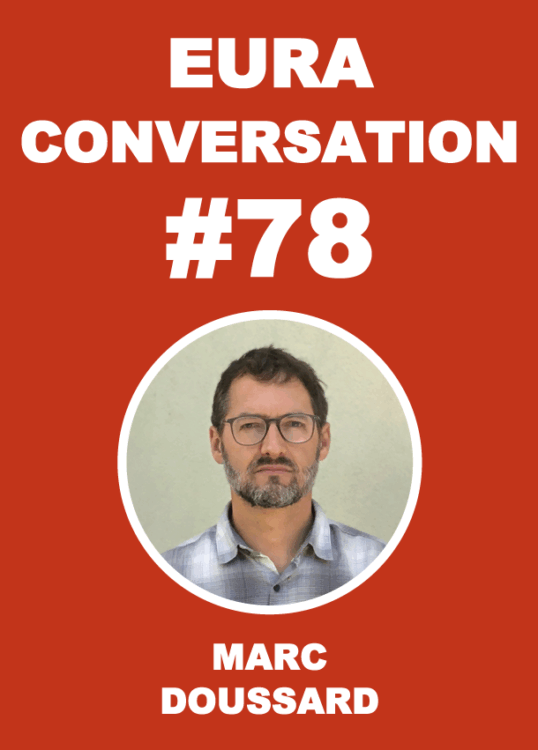
EURA Working Group on Municipal Councillors – News June 2024
11/06/2024
New EURA Institutional Member – 2024, Jun
27/06/2024Conversation #64
Cities and the defence of democracy
by Robin Hambleton
University of the West of England, United Kingdom
 Democracy is under attack. In more than a few countries far right politicians have, in recent years, sought to undermine long-established constitutional, democratic norms and weaken citizen voices.
Democracy is under attack. In more than a few countries far right politicians have, in recent years, sought to undermine long-established constitutional, democratic norms and weaken citizen voices.
For example, as explained in these pages by Ivan Tosics (EC #57), Viktor Orban, the Hungarian Prime Minister, has since 2010 eroded press freedom, damaged judicial independence, and enfeebled elected local governments. A consequence is that Hungary has lurched away from being a society characterised by active citizen participation and the existence of accountable government, towards one in which political power has been super-centralised, with national politicians becoming increasingly authoritarian and repressive.
Unfortunately, Orban is increasingly active in international far-right and nationalist networks and, following his visit, in March, to Mar-a-Lago in Florida, has formed what appears to be a close relationship with former US President, Donald Trump (Bayer, 2024).
It is well understood that Trump, himself, represents a direct threat not just to American democracy but to democratic societies across the world. He has clear autocratic tendencies, disrespects liberal tolerance and is more than ready to violate longstanding democratic norms. Indeed, last November, The Economist took the view that ‘Donald Trump poses the biggest danger to the world in 2024.’ (The Economist, 2023).
How can cities and urban scholars respond to these threats?
In a previous EURA Conversation I suggested that it would be helpful if urban scholars could do more to document the ways in which cities and communities are resisting the rise of right-wing populism. By drawing on discussions that took place in New York City at the International Conference on Urban Affairs: Cities on the Edge organised by the UAA, EURA and ENHR in April, I outline here three suggestions.
1. Celebrate achievements
Victories by progressive movements are often not given the recognition they deserve. For example, in the lead up to the October 2023 Polish parliamentary election hundreds of thousands of people demonstrated against the way the ruling, right-wing Law and Justice Party (PiS) had seized control of the public media, attacked the courts, and was cracking down on the rights of migrants, women and LGTB+ people.
This authoritarianism was met with a remarkable rise in citizen resistance. Cities, communities and non-governmental organisations worked together to hold protest marches and thousands of ‘hate-free’ zones were designated. The culmination of the protests was the ‘Million Hearts March’ held in Warsaw on 1 October 2023. Organised by the Civic Coalition (PO), the main opposition party led by Donald Tusk, this political demonstration brought together between 600,000 and 1 million people and was the largest social protest rally ever held in Poland.
The increased politicisation of Polish society resulted in a very high voter turnout – at 74% the highest in Polish history - in the parliamentary elections. Turnout among young people, particularly women, increased dramatically. A consequence was that the PiS was swept from power by a coalition of three main opposition groups.
2. Defend institutions
Timothy Snyder, in his influential analysis of the way various European democracies collapsed into fascism in the twentieth century, identifies twenty ways in which citizens can resist the rise of tyranny (Snyder 2017). Here I highlight one of his themes – the recognition that democratically accountable institutions have a crucial role in preserving decency in society.
Snyder notes that egalitarian institutions need to be defended. He explains that they will fall, one after the other, as happened in Nazi Germany in the 1930s, if citizens do not fight to protect them. In addition, he rightly draws attention to the importance of public protest and social movements in campaigning for civil rights.
Kurt Weyland, an American political scientist, lends weight to the argument that Snyder presents. His international research demonstrates that, while far-right populism can, indeed, be a mortal threat to democracy, these movements usually fail to suffocate liberal pluralism due to institutional checks, balances, and opposition mobilisation (Weyland, 2024).
If we turn to cities and communities, it follows that countries should introduce, if they do not already have them in place, constitutional changes that secure the legal independence of elected local governments as soon as possible. Such systems, and Sweden’s constitution provides a good example, can provide local authorities with the right to do things differently. The European Charter on Local Self Government is relevant in this context.
Without solid legal protections demagogues, as exemplified by Hungary, can easily destroy local democratic institutions, and impose centralised rule. Such demagogues can be thwarted if solid legal protections are in place.
3. Win the battle of ideas
Right-wing politicians seek to divide communities and turn people against ‘other’ people, for example, non-white people, immigrants, gay people, trans people, and other minorities. The main counter argument, as the Covid-19 pandemic demonstrated so clearly, is that our wellbeing isn’t served by denigrating other people. This is because our wellbeing isn’t individual but social. Much good has come from the way the pandemic was met with an upsurge in social solidarity, including a spectacular increase in the number of people providing help and assistance to neighbours and needy groups of various kinds.
In closing allow me to highlight two themes that deserve, in my view, to be given more attention in ongoing research and analysis by urban scholars and others.
The first concerns the nature of social solidarity. In a major new book tracing the political struggles that have shaped the modern world, Leah Hunt-Hendrix and Astra Taylor explain how solidarity is different from ‘doing good’ (Hunt-Hendrix and Taylor 2024). Solidarity is not selfless. Siding with others is the only way to rescue ourselves from the catastrophes that will otherwise engulf us.
Last year Nazem Tahvilzadeh, in EURA Conversation 52, drew on his experience with the Swedish people’s house movement to offer important insights on the importance of cultivating solidarity in the city. It would be great to learn of other positive examples illustrating how community-based initiatives are promoting solidarity in the city, and I invite readers to provide examples.
My second theme relates to how we understand and conceptualise identity. The populist right usually advocates an exclusive, racialised and backward-looking view of identity. Indeed, right-wing figures often draw on the ‘great replacement theory’, a white nationalist far-right conspiracy theory that claims that white European populations are being replaced by non-white peoples.
In the UK the Brexit Party promoted a nostalgic view of what it means to be English, harking back to a time of empire when ‘Britannia ruled the waves’. In other countries we also find right-wing parties encouraging a nostalgic, nationalistic, and socially conservative view of identity.
Clearly this entirely mythical and misleading conceptualisation of identity needs to be challenged and urban scholars can surely contribute to this endeavour.
Caroline Lucas, Britain’s only Green Party MP, has written a new book that can, perhaps, provide some signposts to possible ways forward (Lucas, 2024). By drawing on English literature and social history she documents in detail how English people, contrary to right-wing rhetoric, have a deep-rooted commitment to the natural world, to radical inclusivity and to civil rights. Her analysis presents an optimistic view of what it means to be English in the twenty first century.
Throughout human history, cities have grown and changed because of migration and immigration. A consequence is that all cities are, to some extent, multi-ethnic. Perhaps, urban scholars, because their work is focussed on cities – inevitably vibrant and multicultural places - can contribute new insights on how to articulate forward-looking and modern ways of understanding and talking about cultural identity.
References:
Bayer L. (2024) Waiting for Trump”: Viktor Orban hopes US elections will change his political fortunes, The Guardian, 25 April.
Hunt-Hendrix L. and Taylor A. (2024) Solidarity. The past, present and future of a world-changing idea.7 New York: Pantheon Books.
Lucas C. (2024) Another England. How to reclaim our national story. London: Hutchinson Heinemann.
Snyder T. (2017) On tyranny. Twenty lessons from the twentieth century. London: The Bodley Head.
The Economist (2023) ‘Donald Trump poses the biggest danger to the world in 2024’, 16 November.
Weyland K. (2024) ‘Why democracy survives populism’, Journal of Democracy, 35(1) 43-58.







Robin Hambleton is right to warn of the dangers of authoritarianism on both sides of the Atlantic and to encourage urbanists to think about both successful examples of resistance and what should be done counter this threat to democracy and well-being. It strikes me that New York City offers an ideal vantage point from which to view both the perils of right-wing authoritarianism and the promise of resistance and egalitarian transformation.
In respect of the former, for decades, the New York City Police Department has been the handmaiden of authoritarian forces that have sought to crush resistance and dissent, and to enforce the social order, usually in the interest of capital or white supremacy, or both. Examples include the forceable removal of protesters from Tompkins Square Park in the late 1980s and early 1990s, the explosion of racist stop-and-frisk policing under mayors Guiliani and Bloomberg, and the recent violent removal of student protesters from Columbia University, as Mayor Adams stamped his authority on unruly elements.
And yet, the city also has a rich tradition of egalitarianism. It is in the political coalitions and institutions of the city’s egalitarian politics that the bulwarks against authoritarianism can be found. Of critical importance is the labour movement. Although union density is relatively low in the United States, and has been in decline for decades, New York City’s unionization rate of 18 percent is far higher than in other major American cities. Moreover, the recent uptick in successful union drives has its epicentre in New York City, exemplified by the successes of the Amazon Labour Union led by Chris Smalls.
Other hopeful developments can be found in the growth of institutions that foster material wellbeing and solidarity among working-class New Yorkers. These include the city’s growing number of Community Land Trusts and tenant organizations that seek to protect residents from the vagaries of capitalism. Both the contemporary labour movement and organizations that seek to decommodify housing are the kinds of multiracial, cross-gender, solidaristic coalitions that will be essential in the fight against right-wing authoritarianism. They also offer concrete examples of egalitarian alternatives in the here and now.
Professor Hambleton raises many accurate and worrying issues about current dismantling of democratic principles in Europe and beyond. I would like to add some thoughts on how urban scholars, and academia in general, could act differently in a context of diminishing democracy in relation to pro-Palestinian rights and anti-war solidarity movement campaigns on our university campuses.
It is not an exaggeration to say that the Palestine solidarity movement is the biggest and most widespread social movement in Sweden (and perhaps Europe and the USA) since the turbulent 1968 uprisings. However, considering how this movement has been blatantly attacked or silenced by mainstream media, intellectuals and academia, the rootedness of democratic values amongst research institutions and practitioners, can seriously be doubted.
Demonstrations have been arranged in cities across Sweden every Saturday since the bombings of Gaza started in October 2023. These demonstrations have been characterized by a deep democratic spirit springing not only from diaspora Palestinians, but also from anti-racism, environmental and justice activists like Greta Thunberg and thousands of others. They reclaim the public spaces of the city to raise awareness of fundamental democratic values, and as such they are a great democratizing force much longed for. However, peaceful student encampments have been met with heavy militarized police interventions – for example at the Royal Institute of Technology and Lund University. The dominant silence on these repressive police violations among academics and in particular the university leaders is shocking.
Social scientists that usually praise values of enlightenment, deliberation and democratic governance seem suddenly awkwardly ignorant of policies that jeopardize these fundamental values. Not to speak about the silences on the main demands of protests: divestment and boycotting of Israeli institutions and advance of solidarism with murdered academics, and protection of students at schools and universities in Gaza. I am afraid that current attitudes among scholars towards the on-going genocide put scholars on the wrong side of “the battle of ideas”. Should we not ask more of urban scholars now during this particular crisis of legitimacy?
Excellent and timely piece Robin. Urban needs to be at the forefront of this struggle. I would add only that some of the so-called defenders of democracy are guilty of appropriating and echoing the far right. Macron and Starmer are just two examples of “centrist” political leaders who flavour their discourses with nativism. The entire West seems to be busy disgracing itself and sabotaging what remains of the old liberal-democratic delusion. Something new and better is required.
I agree fully with the main statements of the excellent piece by Robin. The following two short addendums aim to further develop the basic idea, the importance of local governance in fighting populist ideas.
Hungary is mentioned as a textbook case of Right-Wing Populism, based on the extreme political power of the central government (super majority in Parliament). Yet, in the recent local elections, in June 2024, many of the oppositional local mayors were successful in defending their position, being re-elected, despite the very strong government-led propaganda and communication against them. One of the main reasons was their open and inclusive local policy making, developing strong ties to community groups. In most cases this started with strengthening solidarity networks during COVID, followed by systematic cooperation with local residents afterwards.
In a second observation I have to emphasize the importance of inclusive, solidarity based local governance from the perspective of resilience. Authoritarian governments most often pursue economic growth-oriented policies, which pay little attention to the immense drawbacks of such policies. In authoritarian countries the centralised communication gives little room for real discussions about these conflicts, therefore it is very difficult to explain to the people that the short-term gains propagated by the government lead already in the non-distant future to very serious climate consequences and the collapse of the environment. It is, again, the local level where systematic work can change people’s mind. One concrete battlefield in Hungary is car use: despite the generally car-friendly central government there are examples of progressive local policies to reduce parking spaces and limit car use in several other ways. Inclusive local governments, cooperating with community groups, are of key importance for the change to a more resilient future.
I send sincere thanks to those who have commented so far on this opinion piece. Tim Weaver, Nazem Tahvilzadeh, and Ivan Tosics provide important insights on how cities and communities in the USA, Sweden and Hungary are resisting the far-right in a variety of ways. These efforts to defend democracy draw on different sources of energy but the power of place – meaning the way active local citizens and civic leaders inside and outside the state can bring people together in solidarity with one another to advance the cause of social and environmental justice – is a significant common theme.
Jonathan Davies, writing before the recent election of a Labour Government in the UK, highlights a legitimate concern. In my view centre left political parties that get elected must take radical steps to reduce social and economic inequality, address the climate crisis and, of course, rebuild trust in our systems of governance. If they fail to do this the grievances of ‘left behind’ groups will grow, and unless these grievances are addressed, they will provide fertile soil for the simplistic and divisive ideas promoted by far-right demagogues.
I encourage urban scholars to offer more comments. It would be particularly helpful to learn of yet more concrete examples illustrating how egalitarian approaches to city governance and civic leadership are making a difference in different countries and contexts.
contexts.